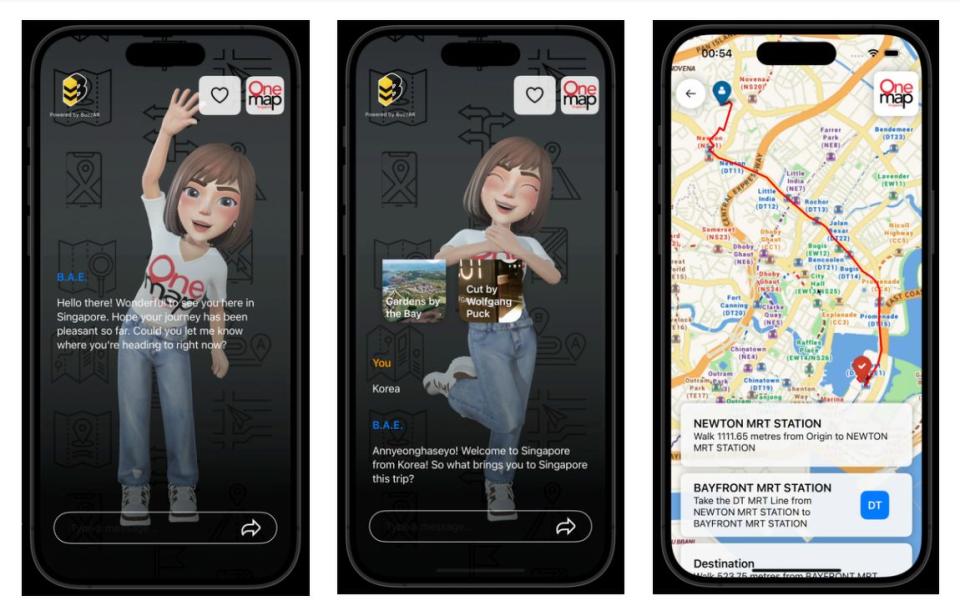Supercharging maps with generative AI

Merging the two can enable a more personalised tourist itinerary or assist decision-making in matters like purchasing a property.
Can generative AI enhance the value of maps to industries and consumers? That’s the challenge the Singapore Land Authority (SLA) gave to participants of its OneMap GPT Challenge last October.
Fast-forward to today, SLA announced the two winning prototypes that incorporated GPT (generative pre-trained transformers) technology and OneMap data to bring value to diverse communities for various purposes, from daily tasks to significant life decisions.
The first is digital tourist buddy BAE (Buzz’s Amazing Entity) by Singapore start-up Buzz ARVR.

Photo: Buzz ARVR
BAE is an AI-powered digital human that delivers a seamless and interactive end-to-end travel experience to tourists. It provides navigational assistance and personalised travel guides to local attractions, restaurants, hotels and events in a human-like conversational manner.
BAE uses OneMap APIs for navigation, routing and display of map-based information. During the development, it also leveraged some of OneMap’s open datasets and recommendations from the Singapore Tourism Board’s Tourism Information & Services Hub platform.
However, the majority of BAE’s recommendations come organically from OpenAI GPT4’s wide knowledge base. As such, Buzz ARVR claims that BAE can support tourism-related queries, including recommending and planning a customised tourist itinerary based on individual user profiles and preferences.
Inter-generational itinerary planner/property finder
The second winning prototype is the inter-generational itinerary planner/property finder developed by the Applied Intelligence Centre of Excellence of Huawei International.

Photo: Huawei International
Running on Huawei Cloud, the prototype integrates geospatial and generative AI technologies with OneMap and private sector data to support various user queries. For example, it could help plan a day itinerary for property viewings based on specific user preferences, and recommend suitable properties for families to reside near their parents.
For the OneMap GPT Challenge, the prototype uses the following data:
Property information, from EdgeProp, ERA, PropNex
Government information such as OneMap Open datasets, Housing Development Board’s housing policies and weather information from the National Environmental Agency
Mobility data from SBS Transit, BlueSG, GetGo, AnyWheel
Retail data such as those from Sheng Shiong and UOB TMRW
Lifestyle information from the National Library Board and Sentosa Development Corporation datasets
Dr Ashley Fernandez, chief data and AI officer at Huawei International, shares with DigitalEdge that the prototype can integrate other datasets to support more use cases when it is launched publicly.
He also says: “One of the underlying complexities in bridging geospatial use cases and GPT AI models goes back to data. Geospatial data by design comprises various formats, along with its dynamic and ever-changing representation of our world in time and space. It’s always exciting to reimagine the entire data and GPT stack through our extensive R&D experience, reengineering and innovating new solutions to old problems.”
Maxi Wang, chief executive officer of Huawei International adds: “Huawei is delighted to have the opportunity to offer our latest innovations. By leveraging synergies between geospatial and generative AI, we hope to fully unleash the true potential and opportunities of data with technologies.
“Moving forward, we will partner with SLA and further develop this prototype. Beyond this collaboration, we are committed to joining hands with more public agencies in Singapore to build up capabilities from knowledge transfer to value creation for the local community and social good, for a more inclusive and sustainable Singapore together.”
See Also:
Click here to stay updated with the Latest Business & Investment News in Singapore
Asia Pacific manufacturers are still top targets of cyber attackers: IBM X-Force
Microsoft to release security AI product to help clients track hackers
Get in-depth insights from our expert contributors, and dive into financial and economic trends

 Yahoo Finance
Yahoo Finance 